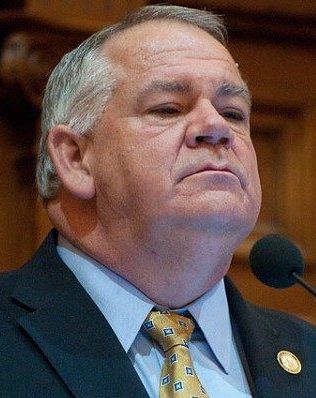By Austin Clark
A recent joint investigation conducted by the Atlanta Journal Constitution and Channel 2 Action News uncovered that lawyer and Speaker of the House Republican David Ralston used his position to delay his client’s court cases. Ralston would write to judges that he would be unable to argue on behalf of his clients because of his legislative duties. This tactic would delay cases for months. Even worse, Ralston would use this excuse even when the legislature would not be in session. He has used this method with clients charged with child molestation, child cruelty, assault, and drunk driving, all while collecting up to $20,000 from each client. The most alarming of these cases has been for a man charged with enticing a child for indecent purposes, which has been awaiting trial since 2009 with 14 delays from Ralston.
After this investigation broke at the beginning of the year, a team of 10 Republican lawmakers filed a resolution to oust Speaker Ralston. While the resolution was quickly squashed in the House days after it was introduced, Ralston’s reputation after this scandal was damaged. Nevertheless, Ralston defended his innocence concerning any wrongdoing when these accusations were made saying, “No action I have taken has been illegal, wrong, unethical, or immoral.”
One of the lawmakers calling for Ralston’s resignation was David Stover from Newnan, who announced this past July that he will be resigning from his position as representative to spend more time with his pregnant wife in the United Kingdom. This triggered a special election for the 71 District to replace the 6-year congressman.
The special general election that took place on September 3 resulted in no one candidate receiving a majority of the votes; therefore, a runoff was required to determine the new representative. The two candidates on the ballot for the runoff were Republican Philip Singleton and Republican Marcy Sakrison. Singleton, a veteran of the Army, labels himself as a “Lifelong Constitutional Christian Conservative Republican” while Sakrison, a teacher, had a platform of increasing awareness of mental health in public schools and pushing a pro-life agenda.
While this election appeared to be unrelated to Ralston’s decision to delay his client’s cases, it is reported that he donated $2,800 to Sakrison’s campaign. This left voters with the question of Sakrison’s loyalty to the speaker entrenched in a scandal that may be far from over. It is not hard to imagine that Ralston’s motivation to donate to Sakrison’s bid for representative was to potentially have an ally in a volatile House if calls for removal of the Speaker grow louder. Sakrison denied that she would be a “pawn” for Ralston if elected, but instead stated that the Speaker supported her because of her conservative agenda and policies.
The runoff between the two candidates occurred on October 1, and with only 10% of the electorate voting, While Sakrison reported almost double the amount contributions for her campaign, Singleton came out on top with 58% of the vote, making him the new representative for Georgia House District 71. According to Singleton, the people of the district are tired of the, “good-ole-boy” system of politics and do not approve of Ralston’s decision to delay his client’s trials due to his legislative duties.
Singleton joins an ever-growing band of lawmakers calling for Ralston’s resignation, which will lead to a dramatic start to the legislative session next year as the fate of the speakership appears to be up in the air. According to the rules of the state house, a speaker will be elected at the beginning of their term and hold the position until the end of their two year term. With Ralston only one year into his current term, he will still hold the position of Speaker unless he willingly resigns. Nevertheless, lawmakers still have tools to harm Ralston during an election year by continuing to shine a light on this scandal to their constituents and colleagues. If enough noise and anger is voiced, then Ralston will have an up-hill battle during his reelection campaign which is poised to start next year. In addition to that, a number of bills could be introduced that indirectly calls Ralston’s behavior out. By proposing a bill limiting the number of postponements of cases, or a bill that looks at the job of lawmakers and the burden it places on the representative, elected officials would be able to indirectly, but effectively, state their disgust with Ralston’s decision, and potentially prevent him from committing such acts again. Whatever the avenue, the tension within the house will be evident throughout the session and the question everyone will be asking is whether or not this Ralston holds firm to his position of innocence or crumbles under the pressure of his constituents.
